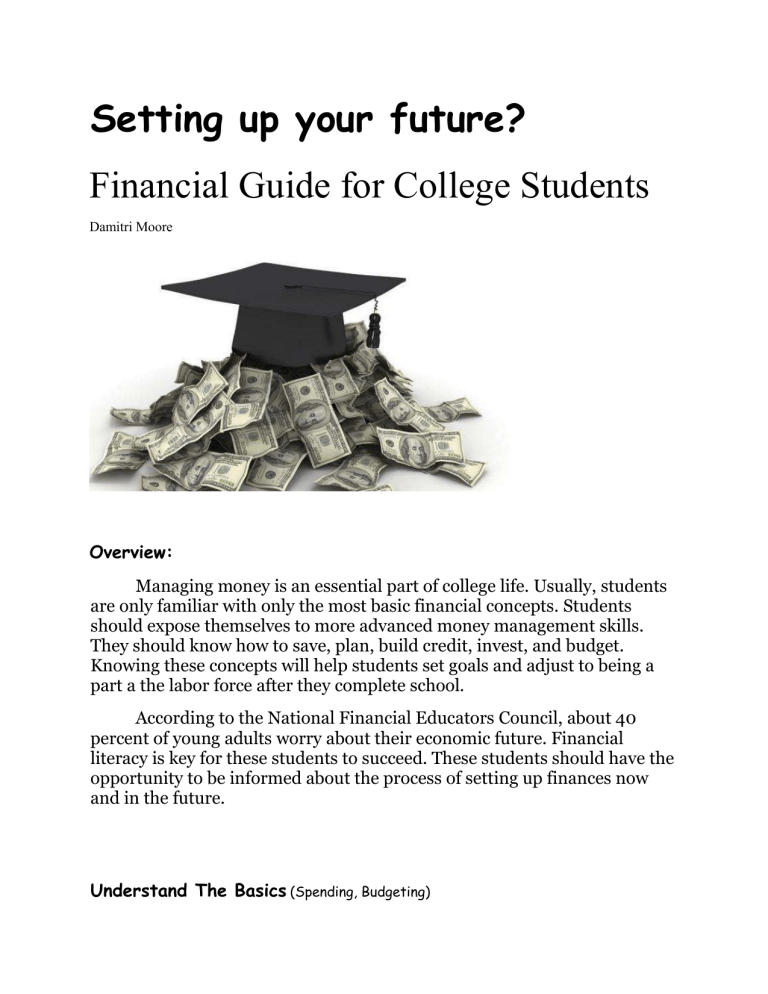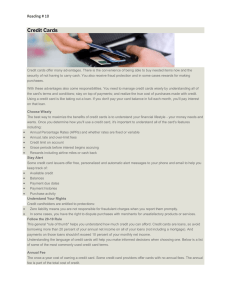Document

Setting up your future?
Financial Guide for College Students
Damitri Moore
Overview:
Managing money is an essential part of college life. Usually, students are only familiar with only the most basic financial concepts. Students should expose themselves to more advanced money management skills.
They should know how to save, plan, build credit, invest, and budget.
Knowing these concepts will help students set goals and adjust to being a part a the labor force after they complete school.
According to the National Financial Educators Council, about 40 percent of young adults worry about their economic future. Financial literacy is key for these students to succeed. These students should have the opportunity to be informed about the process of setting up finances now and in the future.
Understand The Basics (Spending, Budgeting)
I. Before making any decisions, understand the current situation. Consider the amount of monetary resources that are available.
II. Always spend with caution to ensure that essential items are being purchased. Map out major expenses (ex. books, bills payments)
III. Plan out all spending. Make sure that all goods and services are accounted for by routinely monitoring purchases.
Separate Needs from Wants
I. Decide which things are valuable and identify basic needs. Needs can be personal (ex. entertainment, recreation, clothing)
II.Do not waste time and money on things that have little to no value. Put more resources into items/services that have long term benefits.
III. Make sure essential purchases are accounted for in advance. Set a budget that centers around needs (ex. food, school supplies)
Spend Wisely
I. Set timely budgets (week, month). This will prevent overspending and allow long term flexibility.
II. Most money will be spent on non-essential things. Therefore, adjust spending to meet personal needs.
III. Use credit (if available) to help build up a favorable credit score. A good credit score will be vital to future opportunities. (car loans, mortgage rates, insurance premiums)
Watch Over Everything
I. Keep track of loan information by knowing the differences in loans types (public, private, subsidized, unsubsidized)
II. Review term balances to understand the billing processes
III. Review loan balances at the end of each term make a plan for repayment
IV. Be aware of interest rates (fixed, adjustable)
Get Ready for Tomorrow
I. Set Goals Long term goals
2
II. Research what kind of salaries are being offered in your field of study. Start exploring specific job positions.
III. Make plan to repay any student loans in a set amount of time. Explore loan consolidation to reduce the overall interest expenses.
IV. Get introduced to tax information. Learn how to fill out government documents and deal with tax related affairs.
Stay Focused
I. Always prioritize your finances.
II. Learn from mistakes.
III. Seek help. Do not be afraid to contact someone with expertise. (bank managers, professors, customer service)
Sources: http://www.financialeducatorscouncil.org/financial-literacy-statistics/ https://s3.amazonaws.com/rapgenius/filepicker%2Fwkz6AznHSlafWa1mEsfT_watching.jpg
https://www.babygizmo.com/wp-content/uploads/2014/02/Baby-Money-Getty-Images.jpg
3
http://blogs-images.forbes.com/learnvest/files/2014/04/saving-selfish.jpg
http://www.thesimpledollar.com/ten-personal-finance-questions-that-are-always-worth-asking-yourself/
4











